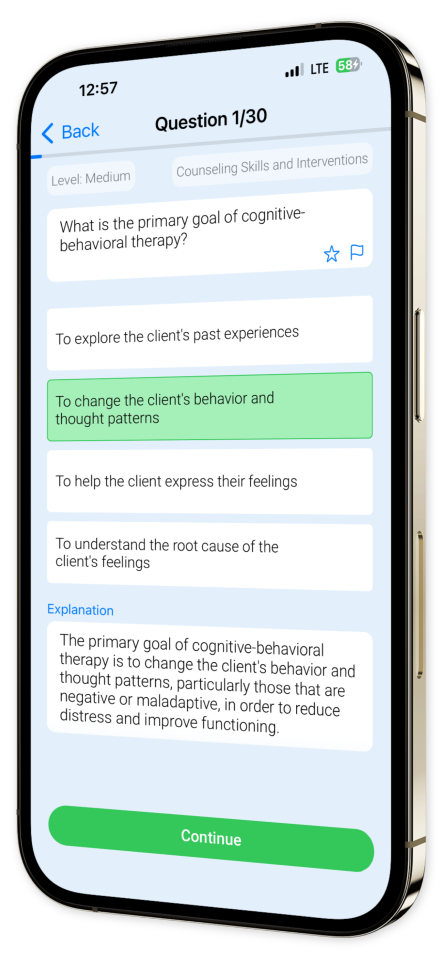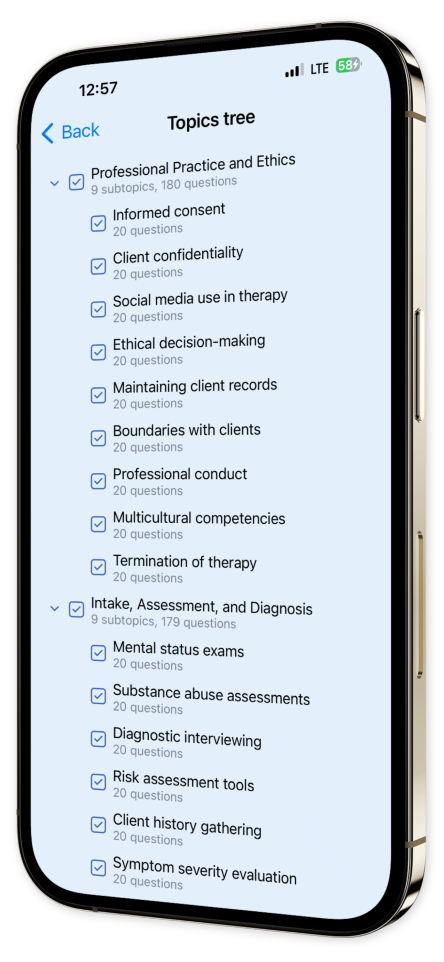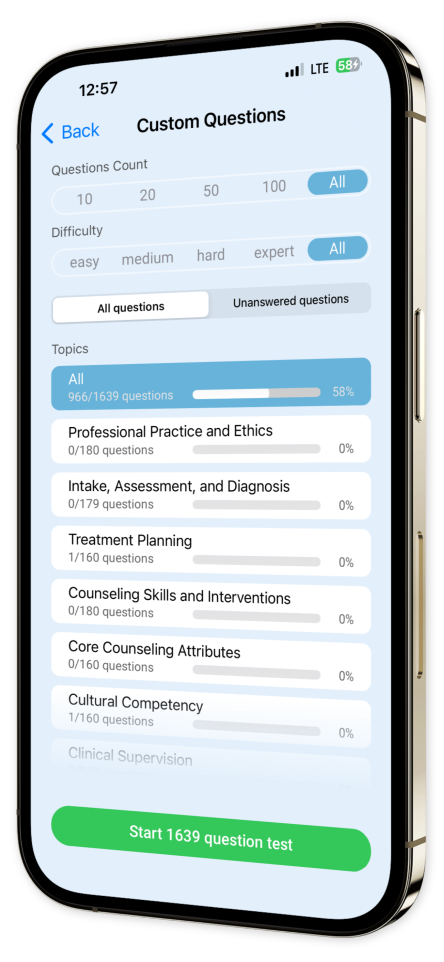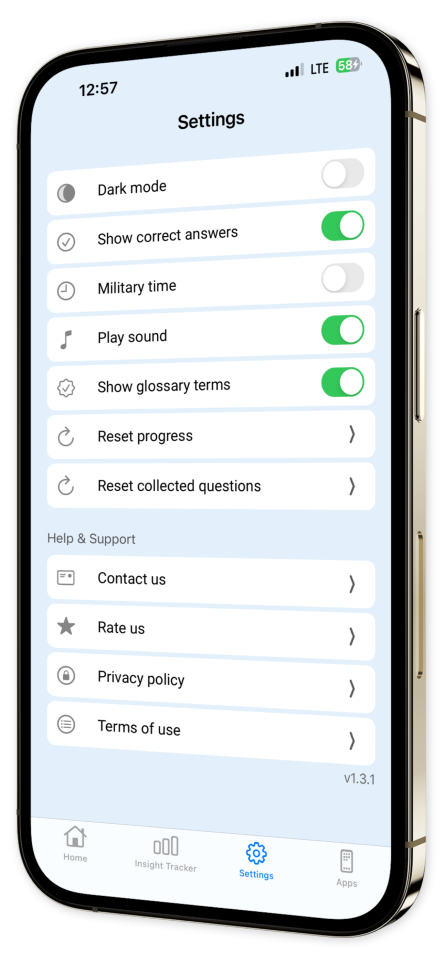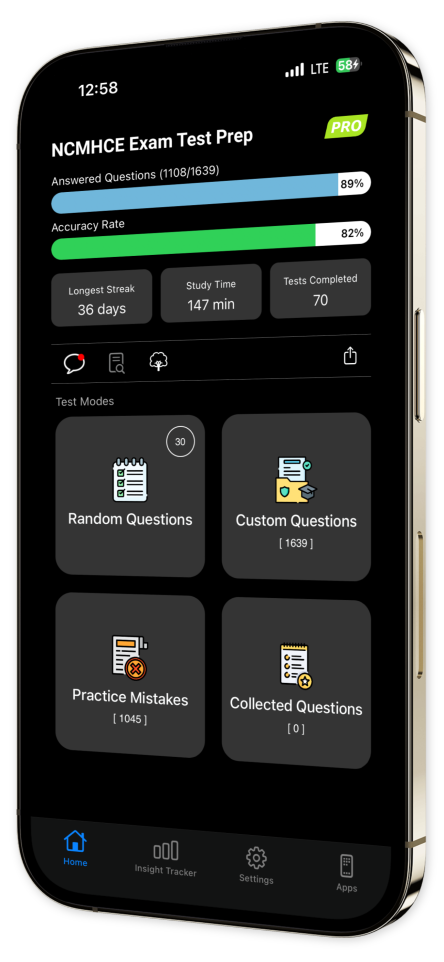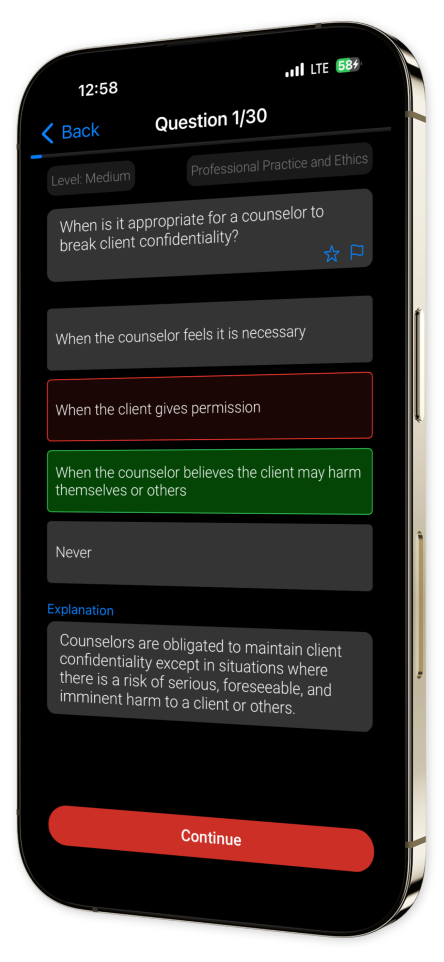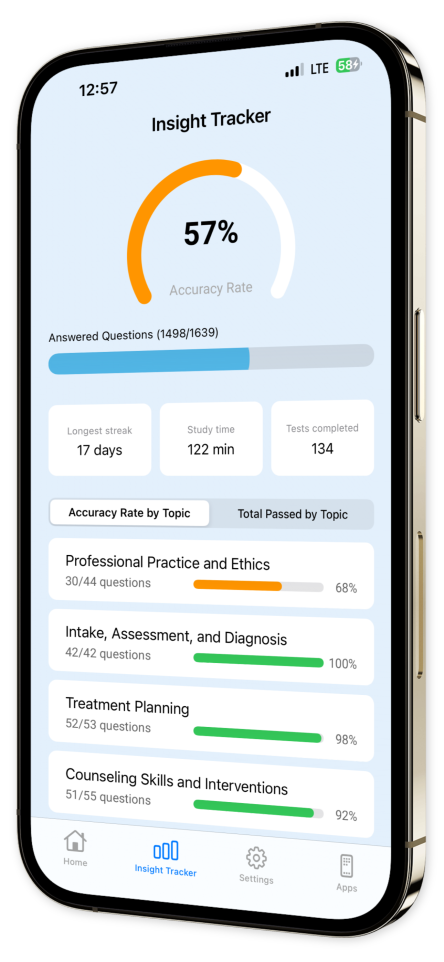
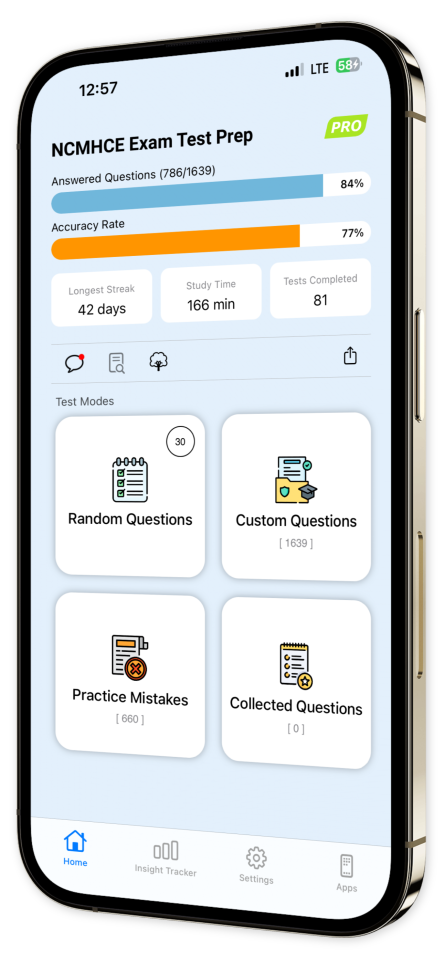
NCMHCE Exam Test Prep iOS and Android App
Prepare for the NCMHCE with NCMHCE Exam Test Prep!
Are you ready to take the next step in your counseling career and succeed in the National Clinical Mental Health Counseling Examination (NCMHCE)? NCMHCE Exam Test Prep provides you with the critical tools and resources to thoroughly prepare for the case simulations that define the exam.
Our app delivers a robust set of case-based practice scenarios that mimic real-world client situations, helping you refine your clinical decision-making, diagnostic assessment, and treatment planning skills. Each scenario is paired with detailed explanations, giving you the insights needed to deepen your understanding of the counseling process.
Customize your study approach by focusing on specific areas of clinical counseling, whether it’s working on treatment interventions or mastering case management. Track your progress throughout your preparation and stay focused on your goal of becoming a licensed clinical mental health counselor.
Join the ranks of future mental health professionals who trust NCMHCE Exam Test Prep to support their journey toward licensure.
Download now and confidently step into your future as a licensed clinical mental health counselor!
Content Overview
Explore a variety of topics covered in the app.
Example questions
Let's look at some sample questions
What is the importance of 'cultural humility' in multicultural counseling?
It allows the counselor to assert their cultural beliefs over the client'sIt ensures that the counselor is seen as the expert in all mattersIt encourages the counselor to understand and respect the client's cultural backgroundIt permits the counselor to avoid discussing cultural issues
'Cultural humility' encourages the counselor to understand and respect the client's cultural background. It involves being open to learning from clients about their cultural experiences and acknowledging the limits of one's own cultural perspective.
What should be done if a client repeatedly misses sessions without notice?
Terminate therapy without discussionCharge the client for missed sessionsDiscuss the issue with the client and consider termination if behavior continuesReport the client to authorities
If a client repeatedly misses sessions, it's important to discuss the issue and its impact on their progress. If the behavior continues, termination may be considered. Charging for missed sessions depends on the agreed terms of service.
Which of the following is NOT typically included in a comprehensive substance abuse assessment?
Client's employment historyClient's physical health statusClient's favorite colorClient's family history of substance use
A comprehensive substance abuse assessment typically includes a client's employment history, physical health status, and family history of substance use to understand the context and contributing factors. The client's favorite color is not relevant to such an assessment.
Which of these is not a recommended strategy for building therapeutic rapport with a client from a different cultural background?
Demonstrating cultural humilityIgnoring cultural differencesSeeking supervision or consultationUsing culturally appropriate interventions
Ignoring cultural differences is not a recommended strategy for building therapeutic rapport with a client from a different cultural background. Cultural competence is crucial in counseling, and it includes being aware of, and respecting, cultural differences.
What does the term 'cultural humility' refer to in the context of cross-cultural communication?
The ability to speak multiple languagesThe counselor's superiority in understanding different culturesAn ongoing process of self-reflection and self-critique about one’s own cultural assumptionsAvoiding discussions about culture in therapy sessions
'Cultural humility' refers to an ongoing process of self-reflection and self-critique about one’s own cultural assumptions, biases, and stereotypes. It involves recognizing and challenging power imbalances in the therapeutic relationship.
What should a supervisor do if they suspect a supervisee is impaired in some way (e.g., substance abuse, mental health issue) that could harm clients?
Ignore the issue unless it directly impacts the supervisee's workImmediately terminate the superviseeDiscuss the issue with the supervisee and take appropriate actionReport the supervisee to the authorities
The supervisor has an ethical responsibility to address any issues that could potentially harm clients. This includes discussing the issue with the supervisee and taking appropriate action, which could include seeking additional supervision, referring the supervisee for treatment, or in some cases, reporting the issue to a licensing board or other authority.
What should a supervisor do if they discover a supervisee has violated a client's confidentiality?
Ignore it as it's the client's responsibility to reportReport the violation to the appropriate authoritiesConfront the supervisee and demand they apologize to the clientCover up the violation to protect the supervisee
The supervisor should report the violation to the appropriate authorities. Confidentiality is a fundamental ethical principle in counseling, and violations must be taken seriously.
What should be done if a client discloses suicidal ideation during a crisis intervention session?
Immediately contact their familyAsk them to promise not to harm themselvesRefer them to a psychiatristDevelop a safety plan
If a client discloses suicidal ideation, it is essential to develop a safety plan. This plan should include strategies for managing suicidal thoughts, identifying warning signs, and providing emergency contact information.
What is the primary purpose of state licensure for mental health counselors?
To ensure counselors have adequate training and experienceTo generate revenue for the stateTo limit the number of practicing counselorsTo make it easier for counselors to get jobs
The primary purpose of state licensure is to protect the public by ensuring that mental health counselors have the necessary training and experience to provide safe and effective care.
What is the consequence for a mental health professional who fails to comply with mandatory reporting laws?
They may be required to take additional trainingThey may lose their license to practiceThey may be finedAll of the above
The consequences for failing to comply with mandatory reporting laws can be severe. They can include losing one's license to practice, fines, and potentially even criminal charges. The exact consequences can vary by state.



